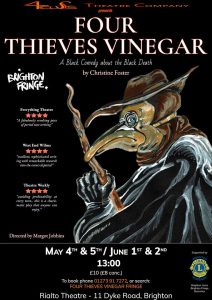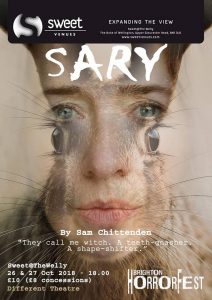Our April 2019 meeting report

Our Brighton Fringe preview event featured extracts and discussions on five upcoming shows. Here’s Simon Jenner’s review of the evening and a great way to consider what to see at this year’s Fringe:#
SPC are gaining a reputation for showcasing and preview. Here the April session featured five such shows, and the acting was already up to performative strength. It’s an ideal way to choose some of the Fringe’s strongest shows, and I’d recommend making a date for every April at SPC to get your fix.
Risqué! by Timothy Coakley
Directed by Murray Hecht
There’s a nice blurb worth quoting: ‘Meet the strip club owner who can’t get the staff, the incompetent sex line operator, the lift attendant with a secret, the man who wants a bigger one, Desperate Denise, inappropriate behaviour, the girl who can’t stop, the wife who can’t believe her eyes, the doctor who gets a shock, and the swingers who want to try something new!’
It’s clearly an ensemble cast playing various characters in a series of 5 to 10 minute sketches.
Tonight featured Sascha Cooper as the lift operator, with a desire to hook a man, and Stewart James Barham as the one who’s almost up for it. Cooper manages to flesh her role as it were as someone who’ll invoke the end of the world to get a little lift.
It’s a fun role but resolutely a sketch, and the kind of genre worth enjoying on 1970s TV.
Female agency and sexuality’s less stereotyped, though and as part of a suite of such sketches it’s enjoyable and well-wrought, if a bit formulaic. Barham too was fine though had less to do. Cooper on this evidence deserves a larger role somewhere and it’d be good to see if Coakley might provide us with a stretch into substantial comedy.
Four Thieves Vinegar by Christine Foster
Here’s a revival worth waiting for, sicne its London premiere. The writer gave a talk on it last tine, and it’s invigorating to see it performed here. Directed by Margot Jobbins, for Four Tails Theatre Company, it’s a privilege too.
Four Thieves Vinegar is a consummate black comedy about the black death and on this evidence easily one of the best things to see in the Fringe when it opens at the Rialto.
It’s set in the dingy depths of Newgate Prison, 1665: the height of the plague. The play finds its four characters – three prisoners and their jailer – in one of the few places currently untouched by the disease rampaging throughout the land.
Simon Holt’s jailor David Parton has little to do here save usher in new inmates. It’d be good to see how his role plays out.
Poor Jennet Flyte – Char Brockes – is the first. It’s a winning performance of fearful containment. Innocent of any real wrongdoing, as far as we see, Flyte’s frightened and clearly never seen the inside of a prison; more than can be said for nurse Hannah Jeakes played by the consummate Sorcha Brooks.
Their attention’s anchored by the one prisoner already in the cell, Liam Murray Scott’s Matthias Richards (the Alchemist). Richards believes he’s found a cure for the plague and implores his fellow inmates to help him make it. But to do that they’ll need gold, and to get that they’ll need to make good use of the only resources at their disposal: sex, wit and lies.
The title’s based on a truth that thieves worked out that vinegar repels the plague – the fleas, though they didn’t know it – to allow them to rob from the plague-consumed dead.
Scott draws a nervous authority, a man obsessed to the extent that he’s relatively oblivious to Flyte, who gradually warms to Jeakes’ persuading her to tell her story, as Jeakes cheerfully tells hers. Still the scene circles around Richards’ offering a way out. a few props and the trio’s acting was exciting, consummate stuff.
At the Rialto at the opening and end of May. Do see this if it’s one of two plays you get to. The other’s recommended directly below. The two that follow that though are eminently fine third and fourth choices
The Wasp by Morgan Lloyd Malcolm
Directed by Kevin Nash, and produced by Eugene Doyle, Lloyd Malcolm’s now famed for Emelia, a superb play premiered at the Globe in 2018 and transferring earlier this year to the West End. This really is a worthy precursor.
Amy Coutts’ Heather has made a success of her life. Gala Orsborn’s Carla is out of cash, willing to take part in an unusual proposition. The women meet up for the first time since leaving school: intrigue and manipulation begins. Carla’s already pregnant with her fifth. Twins she reckons. The prosthesis is remarkably convincing – just one detail showing we’re not just getting an excerpt but a sampled preview.
The Wasp by Morgan Lloyd Malcolm premiered at the Hampstead Theatre in January 2015. Hailed as a psychological thriller it’s more than that yet fulfills this consummately – as anyone who saw it at Hampstead or on its transfer to Trafalgar Studios in January 2016 will confirm. An all-female Sleuth might furnish one parallel.
Anyone seeing this will be struck at how close to its original casting these two actors – who never saw the production – have intuited these roles. That’s not necessary of course but Lloyd Malcolm’s writing suggests similar responses from casting to performance.
Carla’s language is clipped and acutely observed, equally refusing Heather’s unpleasantly articulate assumptions, casually lumping infidelity and failure to nappy-change with wife-beating. Challenged by Carla Heather rejoins unforgivably: ’That is acceptable to some… It’s basically normal. For them.’ Carla, no ‘them’ ripostes ‘My bloke lays one finger on me or the kids and he’s out… what are you going on about?’
What Heather’s going on about is the fact that unlike Carla, her moving on has all been on the outside: she’s still sixteen and wants to drag Carla back there too. It’s an intimately vicious two-hander, Heather’s hyper-articulate rationalising answering every angle that might be aimed at her personal solution.
Coutts conveys Heather’s easily-triggered defences, her gleaming carapace and deep insecurity. Lloyd Malcolm’s neatly prescriptive suggestion that the more manicured middle class woman has trouble conceiving whilst the working class Carla has none might seem a sad cliché out of Blood Brothers, but there’s a reason Carla might remember and this is why Lloyd Malcolm digs deeper than even that musical on class motivation and backstory.
Orsborn’s clipped Carla is savagely good, her every inflection watchful, suspicious, and it transpires flecked with recall at Coutts’ Heather. Like the original Carla, Orsborn’s blonde hair is scraped up, a coping housewife with no time for glamour. Coutts is svelte. This promises to be a first-rate revival.
Chain written and directed by Peter Gardiner, Two Bit Productions
From the team that brought you 2018’s Bully Beef comes Chain, a contemporary play with audio drama interludes. A group of anti-war activists commit themselves to radical new tactics, when they lead to consequences none of them could of foreseen it pushes their beliefs to the edge and threatens to tear the group apart.
The unnamed ensemble cast are excellent and Gardiner should have provided their names as well as roles, so this summary’s a little balder. Piquant is the reappearance of one character who was in an eco-action of 1992, now legendary. Another young man well plays the jaded Marxist and another a man who’s just discovered him. They’re about to act, but it’s a little Rebels Without A Clue or perhaps a route map, and they’re leaning on earlier activists for support.
In truth there’s a powerful groundswell of activism and a regenerated left that needs no harking-back to earlier Anglo-Saxon attitudes. Just watch Novara media, let alone Owen Jones. But this is a strong opening, and twins with another play on radicalism featured tonight – it’s in the air, however sardonically drama needs to frame it.
Well to the fore are flourished acronyms like EDF (English Defence League) the home of Tommy Robinson and now banned. For those of us who share the political aspirations of the studenty types and eternal student types depicted, these are veggie burger and drink, but I’m not convinced everyone would know the names. Perhaps the strong ambiance will render this unimportant.
Further Education by Pete Barrett
Directed by Luke Ofield and Pip O’Neill, Unmasked Theatre
1985: Frank the miner likes doing his job and reading the Sun. Unfortunately, Maggie is after his job and his new housemates definitely don’t like him reading the Sun. In a riotous clash of class, morals and feminism, very traditional Frank finds himself bunking down with three very modern students at the heart of the picketing wars.
In a country seeking to eradicate his livelihood, Frank must decide how he would like to be remembered once the line is inevitably drawn.
We’re treated to three of the cast members, in order of appearance Brontë Sandwell as Claire, Jessica Smith’s Emma, and Ella Verity’s politically active and feminist Rachel. Before Rachel arrives Claire’s found asleep on the sofa – so student-land before loans crushed even lie-ins – is cajoled by Emma who can’t believe Claire’s having an affair with a married lecturer and decides egged on by Rachel to do something about it. But Rachel’s more direct even than that. It’s both funny and unnerving. The acting’s wholly convincing. Sandwell as dippy naïve Claire, Smith as more staunchly feminist, sensible sister mode, and finally Verity as dungareed feminist prepared to take drastic action.
The real drama is about to unfurl. These Essex University students are real, or their actions are. Expressing solidarity during the Miners Strike of 1984-85 they invite one, Frank, to their campus. A culture clash depicted above is more than on the work cards. It’s a strong play, historically grounded, setting us up for that very rare thing, a comedy about a historically grim clash. Here it’s between Thatcher and unions, union members and their naïve allies. Another to see.
SPC has scored with showcasing four strong dramas, all laced with comedy (if two are very black) and by contrast more typical fare in lightning sketches. I’ve booked.
Risqué! by Timothy Coakley
Directed by Murray Hecht
Meet the strip club owner who can’t get the staff, the incompetent sex line operator, the lift attendant with a secret, the man who wants a bigger one, Desperate Denise, inappropriate behaviour, the girl who can’t stop, the wife who can’t believe her eyes, the doctor who gets a shock, and the swingers who want to try something new!
Four Thieves Vinegar by Christine Foster
Directed by Margot Jobbins, FourTails Theatre Company
Four Thieves Vinegar is a black comedy about the black death. Set in the dingy depths of Newgate Prison, 1665: the height of the plague. The play finds its four characters – three prisoners and their jailer – in one of the few places currently untouched by the disease rampaging throughout the land. One prisoner, an alchemist, believes he has found a cure for the plague and implores his fellow inmates to help him make it. But to do that they’ll need gold, and to get that they’ll need to make good use of the only resources at their disposal: sex, wit and lies.
The Wasp by Morgan Lloyd Malcolm
A twisting, taut psychological drama. Heather has made a success of her life. Carla is out of cash and she is willing to take part in an unusual proposition. The two women meet up for the first time since leaving school and the intrigue and manipulation begins. The Wasp by Morgan Lloyd Malcolm had its original production at the Hampstead Theatre in January 2015.
Chain written and directed by Peter Gardiner, Two Bit Productions
From the team that brought you 2018’s “Bully Beef” comes Chain, a contemporary play with audio drama interludes. A group of anti-war activists commit themselves to radical new tactics, when they lead to consequences none of them could of for-seen it pushes their beliefs to the edge and threatens to tear the group apart.
Further Education by Pete Barrett
Directed by Luke Ofield and Pip O’Neill, Unmasked Theatre
1985: Frank the miner likes doing his job and reading the Sun. Unfortunately, Maggie is after his job and his new housemates definitely don’t like him reading the Sun. In a riotous clash of class, morals and feminism, very traditional Frank finds himself bunking down with three very modern students at the heart of the picketing wars.
In a country seeking to eradicate his livelihood, Frank must decide how he would like to be remembered once the line is inevitably drawn.
Award-winning Brighton company Unmasked Theatre returns with a winner from the highly successful Brighton Scratch Night.
















